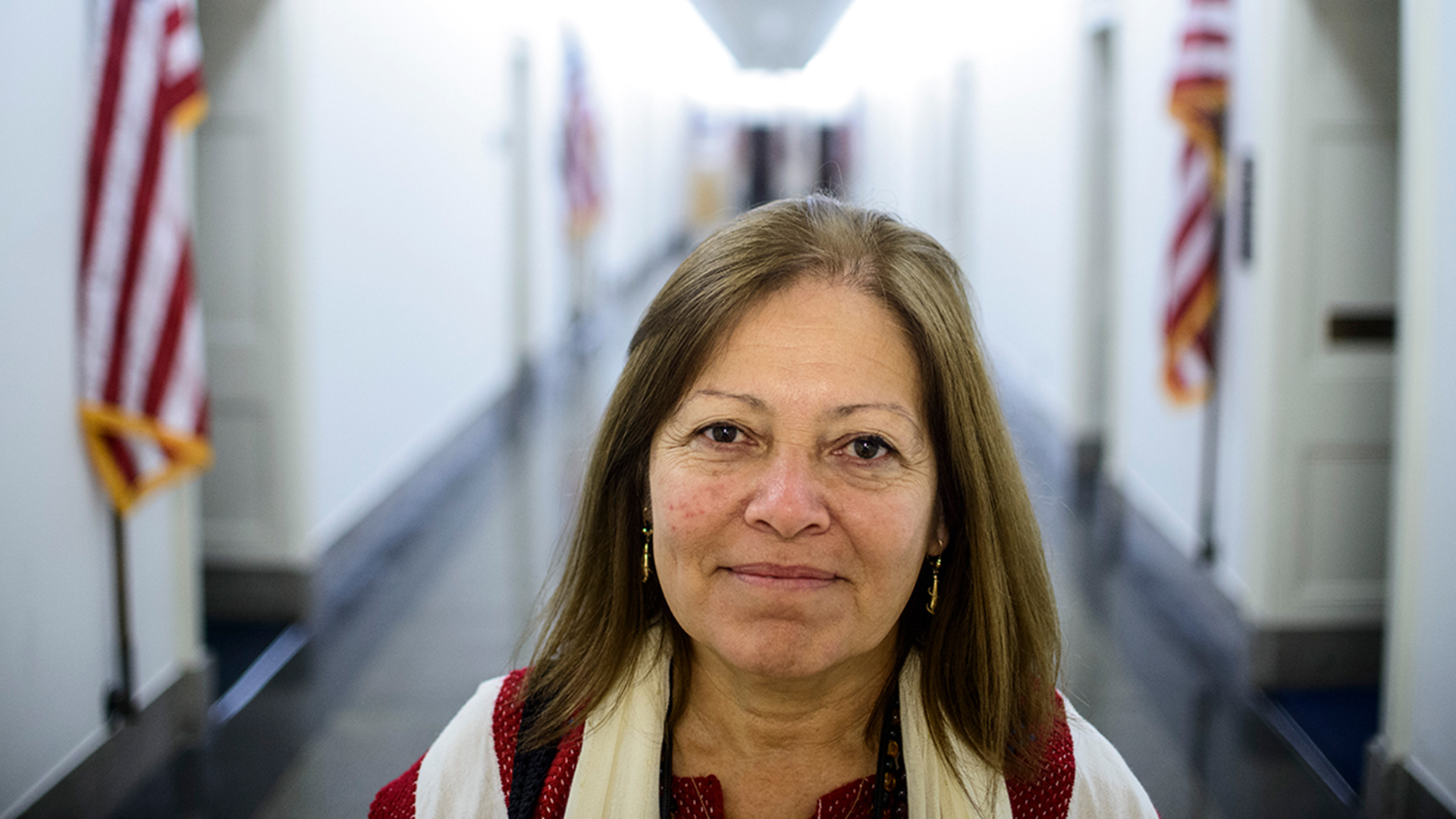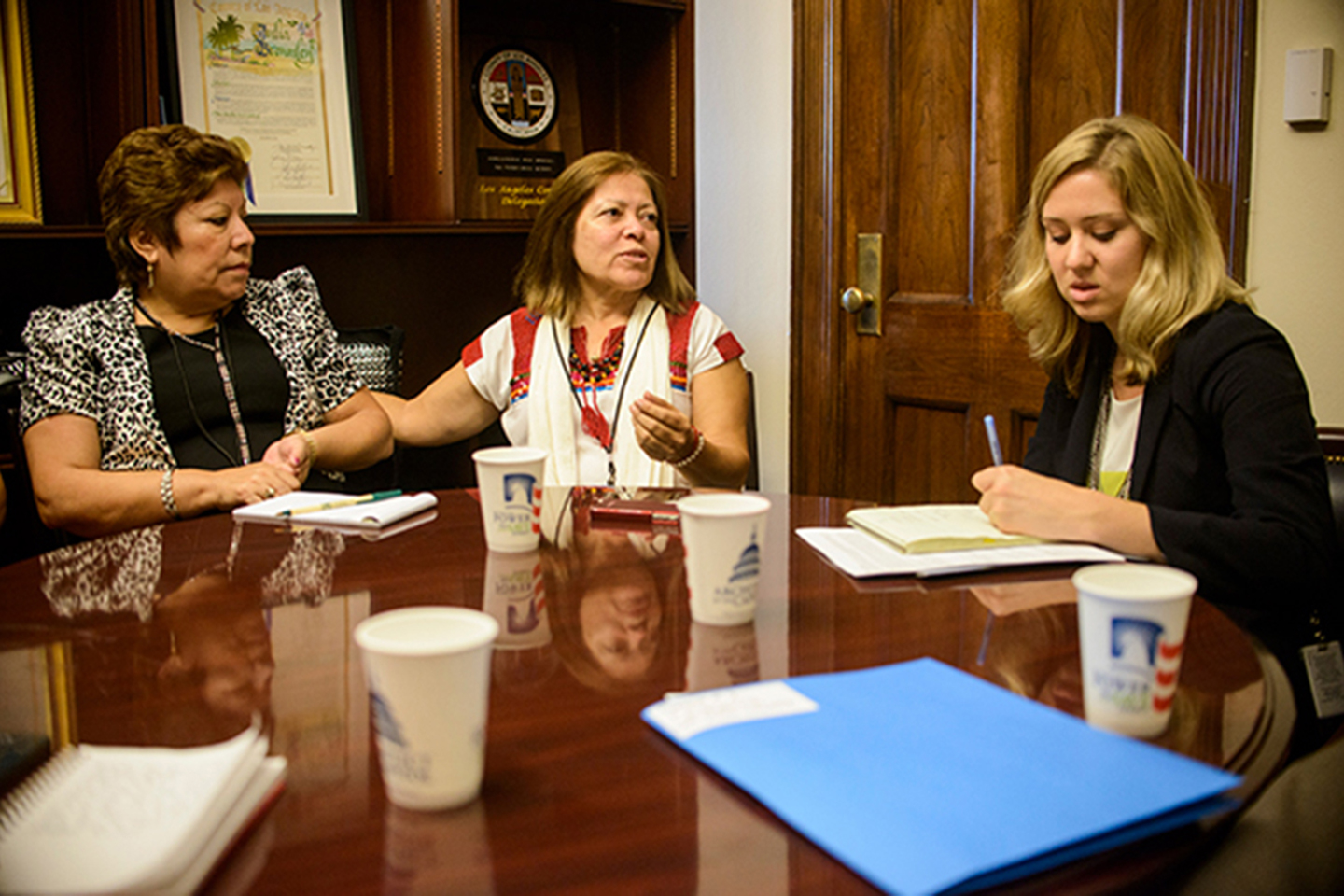Mily Treviño-Sauceda is the co-founder of the Alianza Nacional de Campesinas, the first national farmworker women’s organization. She is also the co-founder and former executive director of Organización en California de Líderes Campesinas, Inc., known as “Líderes Campesinas.” A lifelong activist for farmworkers, she was born in Bellingham, Washington, to a migrant farmworker family.
As a former farmworker, Treviño-Sauceda has firsthand experience regarding issues confronting farmworkers. She has worked on gender discrimination, wage theft, health risks, and immigration reform at the local, state, national, and international levels. Treviño-Sauceda has received numerous awards and recognitions for her work, including being recognized as one of the “100 Heroines of the World” and the Ford Foundation and New York University Leadership for Changing the World Award. She is considered “the leader of the women’s farmworker movement in the U.S.” by the Women’s World Summit Foundation. In 2016, the foundation awarded her the Prize for Women’s Creativity in Rural Life.

What is important to understand about being a woman farmworker?
I come from a migrant farmworker family, starting field work at eight years old. Women who have been farmworkers, or are part of farmworker families, have shared, internalized, and accepted very narrow roles. I’m very outspoken in terms of how women were imposed into gendered roles and made to accept the idea of these differences. As women, we all have gone through exploitation and different discrimination, but we are bonded by a unique experience of being farmworkers yet not equals.
Who helped shape your path and voice in your work as an advocate/organizer?
In my older age, I understand that so many things had to happen to me or my family for me to “get it.” My dad was hired by the United Farm Workers (UFW) union and because he didn’t have as much school, he would ask me to accompany him when he was organizing or negotiating contracts. My mom was involved with church and with the elementary schools my siblings and I were attending. And I also learned from my brothers organizing with the UFW. When I helped form Líderes Campesinas [a leadership development organization for farmworker women in rural California] so much was based on things I learned from being part of the Catholic Church, organizing youth, and from being a part of the UFW with my dad, organizing house-to-house.
What prompted you to start focusing on women farmworker issues?
When I started working for California Legal Assistance, I learned more about how many problems started with housing — inspectors condemned the same kinds of places my own family lived in. I started to see more women, usually accompanying their spouses, as we talked about housing, healthcare, education, and labor issues. I got to see that women were unable to speak up: it wasn’t the norm or permitted. In addition, from my participation in the union, I saw that very few women were involved. I asked my dad, “How come other women won’t come?” Even my mom didn’t want to go because while the men weren’t necessarily disrespectful, women didn’t feel like there was a place for them in the conversation. It was clear that needed to change.
Where did you begin?
One notable moment was when Gilberto Padilla, UFW’s former secretary-treasurer and co-activist with Cesar Chavez, invited me to one organizing meeting with the emphasis that women should be there. He invited the women to take the lead on renegotiating the contract, allowing us a voice and using our strengths as an organizing strategy. And it was like, wow, we didn’t know we could do this. It was three full weeks of just organizing. He would get together with us and ask us about how we thought we needed to do certain things. We just started giving different ideas and he would listen. It stayed with me.
What did you do with that experience?
At one point, Gilberto said, always do anything that you need to do as long as it’s not going to hurt you or your family. So, during grape harvest while seven months pregnant, I jumped on top of a loading truck with boxes, started yelling, and tried to get people to get organized. The driver didn’t know I was up there and started to move the truck and everyone finally started to pay attention in fear of what might happen to me. And so, people finally got out of the fields and organized, even though my method to get them there had more to do with stopping the crazy pregnant lady versus listening to my message. But it worked. A year later, I was hired by the director of the migrant program at California Rural Legal Assistance. It was a turning point for me as I learned from these women through their interviews about the importance of listening to what they really wanted and needed. I learned the need to organize with women for women, so that as women we could create our change and struggle and fight for our needs and issues.

How is it different organizing and advocating, as women in agricultural labor?
First, women organize differently. We do not have to wait to meet in groups to communicate, share ideas, plan, and mobilize. We organize our families first and get them to contribute in various ways, including transport, helping with logistics, caring for our children while we organize, etc. We never thought we were going to build this kind of movement with Líderes Campesinas. We created 12 state chapters of farmworker women. And yet, we had a whole network of farmworker women in California that had connections with women in other states. Our efforts with Líderes Campesinas across California started to come under pressure from a bigger national need. So, we decided to build a national organization, Alianza Nacional de Campesinas, representing 11 different states. Why was this pressure there? Well, part of it was because Líderes Campesinas had started talking about violence against women. In California, we pushed for a statewide program called the Farmworker Women’s Sexual Assault and Domestic Violence Program. It was designed to take on the issues of sexual assault and domestic violence of farmworker women. No other state had this. Then, in 2011 our connections with women nationwide showed more attention was needed to get this to be a national issue. Alianza was able to support and evolve groups in Florida, New York, and Washington.
What are the major advocacy issues for Líderes Campesinas and Alianza?
There are several. Líderes Campesinas focuses on the reauthorization of the Violence Against Women Act. We had examples and evidence of so many cases where women had been sexually harassed and abused in the workplace or at home. We were able to help make changes to the part of the law so women don’t need to be married to a legal resident or a U.S. citizen to be covered by the law. But despite these victories, we’re still heavily advocating around sexual harassment. As we started this work and doing trainings for other organizations, I really began to understand that my experience in silencing myself about my own sexual assault for so many years was what so many others were doing. In addition, Líderes Campesinas and Alianza have worked on the recent Worker Protection Standard. Advocacy was done in collaboration with other great organizations like Earthjustice, Farmworker Justice, the Farmworker Association of Florida, and the Rural Coalition. We were able not only to get hundreds of farmworker testimonies about necessary changes in the standards, but also got to meet with the then administrator of the Environmental Protection Agency, Gina McCarthy, to discuss issues around unsafe use of pesticides and the need for better protections.
What are some of the major barriers to Líderes Campesinas’ and Alianza’s efforts?
Even though much has changed, we’re still dealing with so many taboos and myths about sexual violence. On top of that, our work is all about building trust. A lot of agencies think that because they come to one of our meetings everything is fixed. It’s just the first step. It’s not about thinking that you know what’s best for our community. It’s about us being the servant of that community because we get paid to do that work and give out the information that is needed; people are the ones to decide when and where we are supposed to do it. Funders still miss this, thinking they know what the community needs to do. Real support is about listening and supporting the community’s ability to mobilize itself to promote change. In addition, a big missing piece is: how do women even get connected to be able to start the complicated process of formal complaint and action? Many don’t understand the system. Many don’t know their options, if they will be believed, and how they will be supported.
What’s next for you?
I want to work on how can we get farmworker women into positions — on commissions, boards, councils, counties, state, etc — where they represent us and make decisions for our community. Through Alianza, we have member organizations that were already organizing to help women build their own businesses. Through Líderes Campesinas, we’re doing the same. We’re trying to support women in our culture in becoming small farmers and learning to build their own business. We need to start building our own businesses instead of just working for others, because there’s still so much exploitation. We want to make sure that whatever we build is going to be represented by and governed by farmworker women.



















